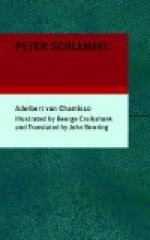One day I said to her, “Minna, the last day in next month will decide my fate, and perhaps change it for the better; if not, I would sooner die than render you miserable.”
She laid her head on my shoulder to conceal her tears. “Should thy fate be changed,” she said, “I only wish to know that thou art happy; if thy condition is an unhappy one, I will share it with thee, and assist thee to support it.”
“Minna, Minna!” I exclaimed, “recall those rash words—those mad words which have escaped thy lips! Didst thou know the misery and curse—didst thou know who—what—thy lover—Seest thou not, my Minna, this convulsive shuddering which thrills my whole frame, and that there is a secret in my breast which you cannot penetrate?” She sank sobbing at my feet, and renewed her vows and entreaties.
Her father now entered, and I declared to him my intention to solicit the hand of his daughter on the first day of the month after the ensuing one. I fixed that time, I told him, because circumstances might probably occur in the interval materially to influence my future destiny; but my love for his daughter was unchangeable.
The good old man started at hearing such words from the mouth of Count Peter. He fell upon my neck, and rose again in the utmost confusion for having forgotten himself. Then he began to doubt, to ponder, and to scrutinise; and spoke of dowry, security, and future provision for his beloved child. I thanked him for having reminded me of all this, and told him it was my wish to remain in a country where I seemed to be beloved, and to lead a life free from anxiety. I then commissioned him to purchase the finest estate in the neighbourhood in the name of his daughter—for a father was the best person to act for his daughter in such a case—and to refer for payment to me. This occasioned him a good deal of trouble, as a stranger had everywhere anticipated him; but at last he made a purchase for about 150,000 pounds.
I confess this was but an innocent artifice to get rid of him, as I had frequently done before; for it must be confessed that he was somewhat tedious. The good mother was rather deaf, and not jealous, like her husband, of the honour of conversing with the Count.
The happy party pressed me to remain with them longer this evening. I dared not—I had not a moment to lose. I saw the rising moon streaking the horizon—my hour was come.
Next evening I went again to the forester’s garden. I had wrapped myself closely up in my cloak, slouched my hat over my eyes, and advanced towards Minna. As she raised her head and looked at me, she started involuntarily. The apparition of that dreadful night in which I had been seen without a shadow was now standing distinctly before me—it was she herself. Had she recognised me? She was silent and thoughtful. I felt an oppressive load at my heart. I rose from my seat. She laid her head on my shoulder, still silent and in tears. I went away.




